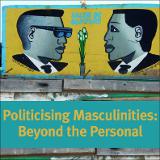| dc.contributor.author | Esplen, Emily | |
| dc.contributor.author | Greig, Alan | |
| dc.date.accessioned | 2015-07-27T13:55:08Z | |
| dc.date.available | 2015-07-27T13:55:08Z | |
| dc.date.issued | 2007 | |
| dc.identifier.citation | Esplen, E. and Greig, A. (2007) 'Politicising Masculinities: Beyond the Personal', workshop report from Politicising Masculinities Symposium, Dakar, 15-18 October | en |
| dc.identifier.isbn | 978 1 858864 675 81 | |
| dc.identifier.uri | https://opendocs.ids.ac.uk/opendocs/handle/20.500.12413/6622 | |
| dc.description.abstract | A diverse mix of people came together in Dakar, Senegal from 13-19 October 2007, to debate issues of men, gender and power: unconventional practical academics, open-minded policymakers, reflective practitioners and activists. It was a unique gathering and offered a unique opportunity – to inform and inspire a greater engagement by men in the struggle for gender justice and broader social change. The symposium was borne out of a realization that much of the most innovative work on men and masculinities has worked at the level of the personal, such as seeking to transform men’s sexual behaviour, violence against women and relations of fatherhood. The HIV epidemic has forced an open space for greater acknowledgement of the fluidity and diversity of men’s sexual and social identities. But relatively little of the innovative thinking and practice that has taken place in relation to these issues has been carried into other areas of development work. Masculine privilege remains unproblematised in mainstream development; and within gender and development the ‘men as problem, women as victim’ discourse continues to hold sway. Both rest on essentialisms that are rarely brought into question. At the same time, work on men and masculinities in development has arguably failed to engage sufficiently with core equity issues, whether in terms of equal pay and leave entitlements, representation in politics, parental rights and benefits, or domestic work, to change the institutions that sustain inequitable gender and sex orders. Amidst recognition that HIV prevention needs to go beyond individual behaviour change and that male violence is also a structural issue, the organisers felt it was time to move the debate beyond the personal to address questions of power and politics. | en |
| dc.description.sponsorship | Swedish International Development Cooperation Agency (Sida), the Norwegian Ministry of Foreign Affairs, the United Nations Population Fund (UNFPA), the Joint United Nations Programme on HIV/AIDS (UNAIDS), the UK Department for International Development (DFID), the Swiss Agency for Development and Cooperation (SDC) and the Ford Foundation | en |
| dc.language.iso | en | en |
| dc.publisher | Institute of Development Studies | en |
| dc.rights | IDS | en |
| dc.rights.uri | http://www.ids.ac.uk/files/dmfile/IDSOpenDocsStandardTermsOfUse.pdf | en |
| dc.subject | Gender | en |
| dc.subject | Sexuality and Development | en |
| dc.title | Politicising Masculinities: Beyond the Personal | en |
| dc.type | Other | en |
| dc.identifier.externaluri | http://www.pathwaysofempowerment.org/archive_resources/politicising-masculinities-beyond-the-personal-workshop | en |
| dc.identifier.team | Gender and Sexuality | en |

